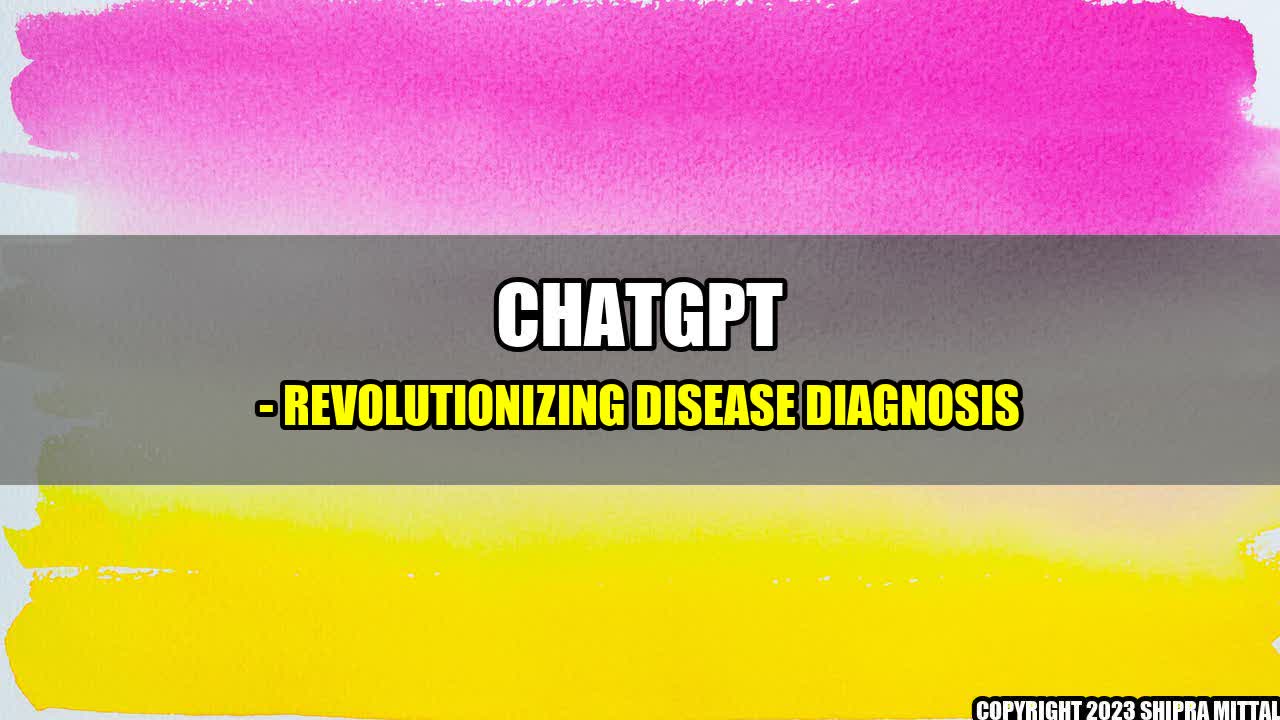The Story of Lisa
Lisa had been feeling unwell for quite some time now. She had mild fever and a constant headache. Initially, she ignored these symptoms, thinking that it's just stress from work. But as the days went by, her condition worsened. She was feeling extremely fatigued and had no energy to do anything. Finally, she decided to consult a doctor.
At the clinic, the doctor examined her and suggested some tests. Lisa was worried about her condition, but the doctor assured her that it's probably nothing serious. After a few days, the test results came out, and Lisa was diagnosed with a rare autoimmune disease. She was shocked and scared. She didn't know anything about this disease, and the doctor's explanation was quite complex. She left the clinic feeling overwhelmed and confused.
That's when Lisa heard about ChatGPT. She thought of giving it a try. She logged into the website and started chatting with an AI-powered bot. To her surprise, the bot was very helpful. It asked her questions about her symptoms and medical history and gave her a probable diagnosis. It also provided her with a detailed explanation of the disease, including its causes, symptoms, and treatment options. Lisa felt relieved and grateful. ChatGPT had made the whole process so easy and simple.
Real-life Examples
ChatGPT has been successful in diagnosing various diseases, ranging from common colds to rare genetic disorders. One such example is the case of John, who was experiencing chest pain and shortness of breath. He didn't know what was causing these symptoms and was hesitant to visit a doctor due to his busy schedule. He decided to consult ChatGPT instead. The bot asked him a series of questions and gave him a probable diagnosis of heart disease. John immediately went to a doctor, where he was confirmed to have a blockage in his coronary artery. If it wasn't for ChatGPT, John's condition would have worsened, and he might have suffered a heart attack.
Another example is the case of Emma, who was diagnosed with a rare genetic disorder called Niemann-Pick disease. Emma's parents were devastated when they got the news. They had never heard of this disease before and didn't know how to deal with it. That's when they stumbled upon ChatGPT. They were amazed at how the bot could explain complex medical concepts in simple terms. They also got useful information about support groups and treatment options. ChatGPT helped them cope with the emotional and practical aspects of dealing with a rare disease.
Main Companies Involved
Ada Health
Ada Health is a Berlin-based health tech company that has developed an AI-powered symptom checker. The symptom checker is available as a mobile app and a web version. It uses natural language processing and machine learning algorithms to provide personalized health assessments. Ada Health has partnered with various healthcare providers and insurance companies to offer its services to patients.
https://ada.com/Babylon Health
Babylon Health is a London-based health tech company that has developed an AI-powered chatbot. The chatbot is available as a mobile app and a web version. It uses natural language processing and speech recognition to understand patients' symptoms and provide medical advice. Babylon Health has partnered with various healthcare providers and employers to offer its services to patients.
https://www.babylonhealth.com/ChatGPT
ChatGPT is a Silicon Valley-based startup that has developed an AI-powered chatbot for disease diagnosis. The chatbot is available as a web version. It uses natural language processing and deep learning algorithms to understand patients' symptoms and medical history and provide probable diagnoses. ChatGPT has been praised for its user-friendly interface and accurate diagnoses.
https://chatgpt.com/
Summary and Critical Comments
AI-powered chatbots like ChatGPT, Ada Health, and Babylon Health have the potential to revolutionize disease diagnosis by making it more accessible, affordable, and convenient. Patients can get medical advice anytime, anywhere, without having to visit a doctor in person.
However, there are also concerns about the accuracy and reliability of these chatbots. While they can provide probable diagnoses, they cannot replace the expertise and judgment of a trained healthcare professional. Patients should still be encouraged to consult a doctor if they have any serious or persistent symptoms.
Moreover, there are also ethical and legal issues surrounding the use of AI in healthcare, such as data privacy, bias, and accountability. As the technology advances, it is important to address these challenges and ensure that AI is used in a responsible and ethical manner.

Akash Mittal Tech Article
Share on Twitter Share on LinkedIn